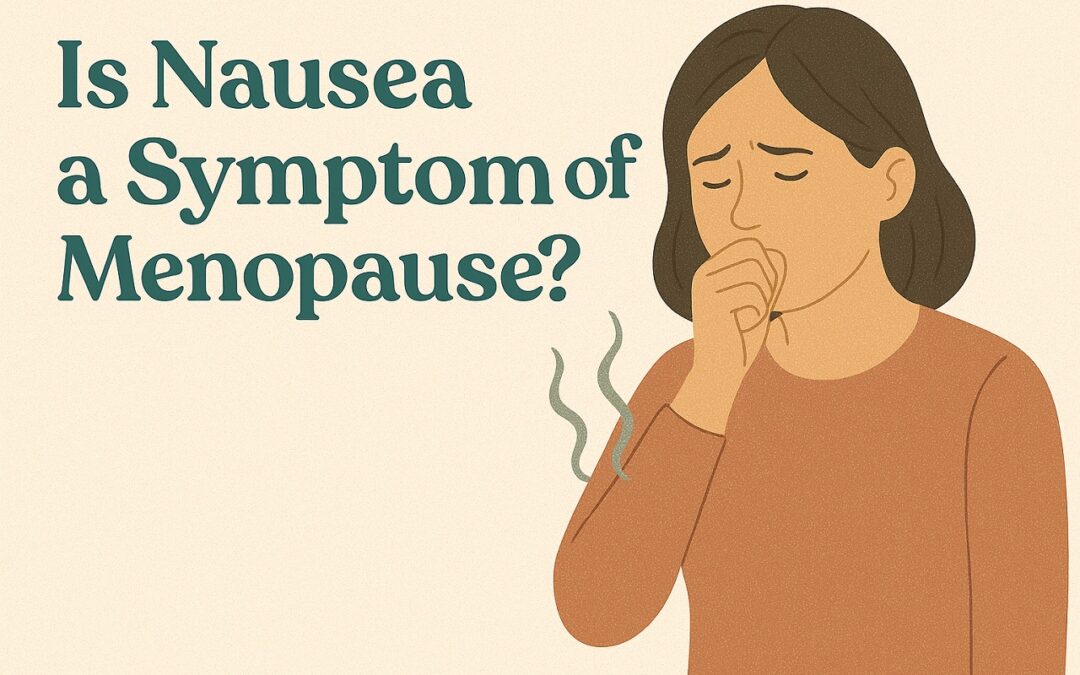Nausea is not usually the first symptom that comes to mind when discussing menopause, yet many women report it during the transition. While not as common as hot flashes or sleep issues, nausea can be a direct or indirect result of the hormonal shifts that define menopause.
Understanding the connection between menopause and nausea is key to managing it effectively. This page breaks down the causes, contributing factors, and treatment options for nausea during menopause.
What Happens During Menopause?
Menopause marks the end of menstrual cycles and is officially diagnosed after 12 consecutive months without a period. Most women reach menopause between ages 45 and 55. However, the transition, known as perimenopause, can begin years earlier. During this phase, hormone levels begin to fluctuate significantly.
Common Menopausal Symptoms
Menopause is known to cause a variety of symptoms due to declining levels of estrogen and progesterone:
- Irregular periods
- Hot flashes
- Night sweats
- Vaginal dryness
- Mood swings
- Sleep disturbances
- Decreased libido
In addition to these well-known symptoms, some women experience digestive issues, including nausea, which can be confusing if not expected.
Is Nausea a Symptom of Menopause? What Are the Causes?
Yes, nausea can be a symptom of menopause. It may not affect every woman, but for some, it becomes a noticeable part of the experience. The causes are often complex, involving a mix of hormonal, neurological, and gastrointestinal factors.
1. Hormonal Imbalances
Estrogen and progesterone play a role in regulating many body systems, including the digestive tract. As these hormones decrease, several effects may occur:
- Slower gastric emptying
- Changes in bile production
- Altered gut motility
These changes can lead to feelings of bloating, indigestion, and nausea.
2. Hot Flashes and Sweating Episodes
Some women experience nausea alongside or shortly after hot flashes and night sweats. This may be due to a sudden spike in body temperature, which can affect the digestive system and trigger discomfort. In certain cases, the nausea may be more intense in the morning or during the night, interrupting sleep and worsening fatigue.
3. Mental Health and the Gut-Brain Connection
Menopause often brings emotional changes such as anxiety and depression. These mental health shifts can also impact digestion. When stress hormones increase, they can slow down digestion or lead to nausea, stomach pain, and other gastrointestinal symptoms.
Other Possible Causes of Nausea During Menopause
While menopause itself can be responsible for nausea, other unrelated or compounding factors should not be overlooked. These include:
- Food sensitivities or poor diet
- Gastrointestinal conditions like acid reflux or gastritis
- Medications unrelated to hormone therapy
- Viral infections or stomach flu
- Pregnancy (especially during perimenopause, when cycles are irregular but fertility may still exist)
If nausea is frequent, intense, or does not improve with lifestyle changes, it is important to investigate these other causes.
How to Manage Nausea During Menopause
Several effective approaches can help reduce or eliminate nausea during menopause. These include lifestyle changes, medical options, and support from experienced healthcare providers.
1. Adjust Diet and Eating Habits
- Eat smaller meals throughout the day
- Avoid greasy, spicy, or highly processed foods
- Include more fiber and hydration
- Reduce caffeine and alcohol intake
Keeping a food journal can help identify and eliminate nausea triggers.
2. Lifestyle Modifications
- Engage in regular, moderate exercise such as walking or yoga
- Prioritize sleep hygiene to reduce nighttime nausea and fatigue
- Use stress-reducing techniques like breathing exercises and mindfulness
These small shifts can support hormone balance and digestive health.
3. Consider Hormone Replacement Therapy (HRT)
Hormone Replacement Therapy may help relieve nausea indirectly by stabilizing hormone levels, especially when nausea is linked to hot flashes or severe mood changes.
At Amazing Meds, we provide individualized HRT solutions based on your hormonal profile and symptoms. Our clinical team monitors each patient closely to ensure optimal results and minimal side effects.
When Should You See a Doctor?
Nausea that is severe, persistent, or accompanied by other symptoms may indicate a separate medical issue. Contact a healthcare provider if you experience:
- Unintentional weight loss
- Severe abdominal pain
- Vomiting that lasts more than 24 hours
- Blood in vomit
- Signs of dehydration
Timely evaluation can help rule out gastrointestinal disorders, gallbladder disease, or other conditions requiring specific treatment.
Let Amazing Meds Help You Feel Like Yourself Again
You do not have to tolerate unexplained or persistent nausea as part of menopause. At Amazing Meds, our clinical experts specialize in customized hormone replacement therapy, HGH, and peptide therapy that are designed to support your full health during this life stage. If you are struggling with nausea, fatigue, or other menopause symptoms, we will work with you to identify the root cause and develop a safe, effective treatment plan.We believe in personalized care that works with your body. Visit Amazing Meds today to learn how our evidence-based therapies can help you feel like yourself again.

